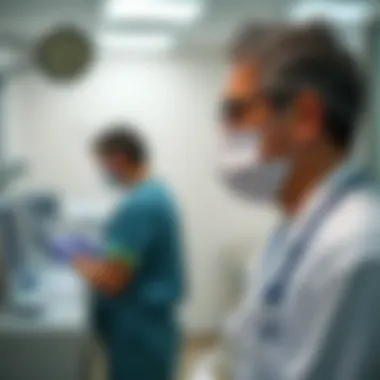Comprehensive Guide to Visa Medical Tests in Dubai


Intro
Navigating the medical requirements for a visa in Dubai can feel like wandering through a labyrinth without a map. With an influx of expatriates drawn to the city’s diverse offerings, the visa medical test has emerged as a critical checkpoint in the journey of establishing oneself in this vibrant locale. Understanding the test's necessity is not just a box-ticking exercise—it fundamentally safeguards public health and upholds the rigorous standards set by the Emirates.
This guide aims to illuminate the comprehensive landscape of visa medical tests, outlining essential requirements and procedures that must be followed by expatriates and residents alike. From the specifics of the medical examination itself to potential obstacles that may arise, this overview provides the clarity needed to navigate the process smoothly. By the end of this exploration, you should not only grasp the ins and outs of the medical testing system but also be better prepared to tackle challenges that may lie ahead.
"Health and well-being are paramount, making understanding one's medical obligations essential to a smooth immigration experience."
By diving deep into the importance of the medical assessments, delineating the step-by-step procedures, and offering pragmatic tips for success, we will set the stage for a less cumbersome transition into life in Dubai's dynamic environment. Additionally, consideration for different visa categories ensures tailored information, making this guide valuable for various individual circumstances.
Why It Matters
For expatriates planning to settle in Dubai long-term or securing residency, the visa medical test serves several purposes:
- Health Assessment: Tests typically check for communicable diseases that can pose public health risks.
- Regulatory Compliance: Meeting the medical requirements is a crucial step before your visa application is approved.
- Personal Peace of Mind: Knowing one's health status can be incredibly reassuring as you build your new life.
Understanding the medical test process is essential, turning what could be a confusing hurdle into a clear pathway that leads to successful integration into Dubai's social and professional fabrics. As we delve further, it's essential to recognize the implications of these required tests and what expatriates must prepare for when embarking on their journey.
Stay tuned as we unpack the requirements, procedures, and practical tips to ensure that your visa medical test experience is as straightforward as can be.
Prolusion to Visa Medical Tests
Navigating the visa application process can often feel like a labyrinth, especially in Dubai, known for its dynamic lifestyle and diverse expatriate community. Central to this journey is the visa medical test, an essential component that not only ensures the health of applicants but also reflects the public health priorities of the UAE. Understanding these tests is fundamental for anyone aiming to secure a visa in this bustling city.
Purpose and Significance
Visa medical tests serve multiple purposes, each contributing to the seamless integration of expatriates into the UAE. Firstly, they help ascertain that the applicant does not carry any communicable diseases that could pose a threat to public health. By requiring these screenings, the UAE is making a staunch statement about its commitment to maintaining a healthy society. This proactive approach aids in curbing the spread of diseases within its borders.
Furthermore, understanding the significance of these medical tests extends beyond the basic requirements. It sheds light on the importance of health in the workplace environment. Employers are often mandated to ensure that their workforce is healthy, which fosters productivity and reduces medical costs, another essential aspect for businesses striving for success amidst competition.
In essence, these tests do not just safeguard the UAE’s health but also establish a safety net for expatriates, helping to ensure their well-being while living and working in this vibrant locale.
Scope of the Test
The scope of visa medical tests in Dubai encompasses a thorough examination that examines different facets of an applicant's health. Typically, the process involves several components, each critical to evaluating an individual's fitness for residency or employment.
The tests usually include:
- Blood tests: These are conducted to screen for communicable diseases such as HIV, Hepatitis B, and Hepatitis C, among others.
- Chest X-ray: This test aims to identify any pulmonary diseases, particularly tuberculosis, which remains a concern in many regions.
- Physical health evaluations: A general physical examination is carried out to assess the applicant's overall health status.
Each of these elements plays a crucial part in painting a complete picture of the applicant's health, ensuring that they meet not only the medical requirements but also the social responsibility expected by the UAE authorities.
The entire assessment reflects a combination of regulatory compliance and a shared commitment to health, paving the way for a robust expatriate community that can thrive and contribute to the UAE’s development.
Eligibility and Requirements
The topic of eligibility and requirements for visa medical tests in Dubai is crucial for anyone hoping to reside or work in this vibrant emirate. Understanding these specifics can save applicants time and frustration, ensuring a smoother transition into their new lives. Not only do these requirements serve as a gatekeeper for health standards, but they also play a pivotal role in protecting the public health of the wider community. Each visa category has its unique set of health criteria, making it essential for applicants to grasp what’s needed before diving into the medical exam process.
General Requirements
When it comes to the general requirements for the visa medical test in Dubai, there are several key elements that applicants must keep in mind. Primarily, all expatriates applying for a visa must undergo a medical examination conducted by an authorized center. This regulation ensures consistency in the assessment process and fosters trust in the reported health status of all applicants.
One of the primary checks involves verifying a person's immunity to specific diseases, particularly communicable ones like tuberculosis and HIV. Having proof of these vaccinations can often streamline the process and may even negate the need for specific tests.
Also, it’s worth noting that individuals might be required to undergo additional screenings based on their nationality and the visa category for which they are applying. For instance, residents from certain countries could face stricter scrutiny if those nations are known for particular health risks.
Document Checklist
Preparing for the medical examination starts well before entering the clinic. Ensuring you have the right documents in order can help make the process as smooth as butter. Here’s a handy checklist to get you started:
- Original passport: Your passport is your primary identification document. It’s essential to have it with you.
- Visa application form: Fill out the necessary visa application forms before your appointment to avoid delays.
- Real-employment offer letter (if applicable): If you’re applying for an employment visa, having a copy of your job offer letter is crucial. This verifies the purpose of your stay in Dubai.
- Previous medical records: If you have prior health assessments or vaccination records, bringing these along may be beneficial, especially in case further vaccinations or screenings are required.
- Passport-size photos: You might need a couple of these for various forms during the process.
Remember: It’s always best to double-check with the medical testing center about specific documentation they require. Different clinics may have slightly varied standards.
By adhering to these eligibility and document requirements, applicants can navigate through the visa medical test procedure with relative ease. This preparation not only reflects well on the individual but ultimately aligns with the health standards set forth by the Dubai government.
The Medical Examination Process
The medical examination process is a crucial phase in obtaining a visa in Dubai. Understanding this process can save applicants a lot of time and potential headaches. Whether someone is looking to work, study, or join family members, passing the medical examination confirms fitness for living in the UAE. The examination serves both as a health check for the individual and a way for the UAE government to ensure public health.


Furthermore, knowing the steps and requirements beforehand can smoothen the path toward completing the medical tests. With the right preparation, applicants can navigate the procedures more efficiently, avoiding delays caused by incomplete documentation or misunderstandings. Getting familiar with the typical steps also helps curb any anxiety that may arise from the unknown.
Step-by-Step Procedure
Navigating the medical examination process involves several key steps that applicants must follow:
- Choose an Approved Medical Center: Start by selecting a medical facility recognized by the UAE health authorities. A list of approved centers can usually be found on government websites.
- Book an Appointment: It's advisable to make an appointment in advance to ensure that you can be seen promptly. Some centers may also allow walk-ins, but it's often riskier in terms of wait time.
- Gather Required Documents: Ensure you have all necessary documents handy. This typically includes your passport, visa application, and photos.
- Undergo Initial Consultation: At the medical center, a brief consultation with a physician will occur. They will check your medical history and discuss any health concerns you may have.
- Complete the Tests: The examination includes a series of tests such as blood work, a chest X-ray, and a physical examination. Each test checks for specific conditions mandated by the UAE's health regulations.
- Receive Results: Within a few days, you will typically receive your test results. It is essential to follow up with the medical center if you do not receive them within the expected timeframe.
Following these steps ensures a thorough understanding of what to expect, allowing applicants to feel more confident throughout the process.
Duration of the Examination
The duration of the medical examination can typically vary, depending on multiple factors, including the medical center's location and workload. However, generally, the entire process can take anywhere from a few days to up to a week.
- Appointment to Completion: Most individuals spend about one to two hours at the medical center for the tests. These include the blood tests, chest X-rays, and a brief physical assessment.
- Waiting for Results: The waiting time for results can also extend based on the specific procedures of the health facility. Major clinics might offer quicker turnaround times due to advanced equipment and capabilities.
It can be helpful to plan accordingly, allowing some flexibility in schedules to accommodate any unforeseen delays in receiving results. The last thing an applicant wants is to find out that the medical examination is holding up their visa processing.
It is always wise to verify the operation hours of the selected medical center, as they can vary, especially around holidays.
In summary, understanding the medical examination process in Dubai not only aids applicants in meeting the requirements but also deepens their awareness of what living and working in the UAE entails.
Components of the Medical Test
Understanding the components of the medical test is crucial for anyone navigating the visa process in Dubai. Each component plays a pivotal role in determining an individual’s health status and eligibility for residency or employment. The tests not only ensure the well-being of the person applying but also safeguard the health of the community at large.
This section dissects the essential elements of the medical examination, including blood tests, chest X-rays, and physical evaluations, each serving a distinct purpose in assessing general health and identifying any potential health risks.
These tests are not to be taken lightly; they can carry significant weight in application outcomes. It’s imperative to comprehend what each test entails, what it reveals, and how to prepare for them.
Blood Tests and Screenings
Blood tests are a cornerstone of the visa medical process. Typically, they check for a variety of health concerns, including:
- Infectious diseases: Such as HIV, Hepatitis B, and Hepatitis C.
- Complete Blood Count (CBC): This determines overall health and can reveal a range of conditions through the measurement of different components of blood.
- Biochemical panels: These measure different substances in the blood, providing information about the liver and kidney function, electrolyte levels, and blood sugar levels.
These tests are vital assets in painting a complete picture of an applicant’s health. Results from blood tests can greatly influence the outcome of visa applications. For example, if there’s a positive result for a serious infectious disease, this may lead to complications or even disqualification of the visa request.
Harvesting accurate blood test results entails a few steps. It's wise to maintain a proper diet and hydration before the appointment. Moreover, follow any specific instructions from your medical provider, like fasting, if required.
Chest X-ray Examinations
Next up on the assessment list is the chest X-ray. This examination is often viewed as a necessary barometer for respiratory health. The primary focus is to check for tuberculosis, a disease that holds significant public health implications, particularly in densely populated regions.
During this process, the applicant stands in front of an X-ray machine and takes a deep breath while the image is taken. It’s quick and relatively painless, but the stakes are high. If the X-ray indicates possible tuberculosis or other lung conditions, further evaluation may be needed, affecting the visa approval timeline.
Furthermore, keeping in mind that precision and clarity of the X-ray images are vital is important. Therefore, ensure you follow all guidelines around preparation, such as wearing specific clothing or removing any items that could interfere with the imaging.
Physical Health Evaluation
The physical health evaluation wraps up the primary checks. This typically involves a thorough examination by a licensed medical professional who will assess:
- Body mass index (BMI): This helps gauge if you fall within a healthy range.
- Vital signs: Checking heart rate, blood pressure, and overall fitness level.
- General health inquiries: The doctor may ask about any pre-existing conditions or ongoing health issues.
The objective here is to ascertain that applicants have a reasonable level of health that wouldn’t endanger public safety. Each evalutation carries specific components that can, directly or indirectly, influence visa approvals. For example, a noticeable health issue may transform the application process, potentially leading to additional scrutiny.
By going into the medical examination process well-informed about each component and its significance, applicants can minimize stress and ensure they are prepared for whatever lays ahead. It pays off to be proactive and knowledgeable, as a clear understanding turns potential hurdles into manageable concerns.
Visa Categories and Their Medical Requirements
The visa medical tests in Dubai are not one-size-fits-all. Each visa category demands a unique set of requirements, and understanding these specifics is crucial for a smooth application process. The medical tests ensure that individuals applying for various visa types meet health standards mandated by the UAE government, reflecting both personal health and public safety. Navigating these tests appropriately can save time and headache during your application journey, making clarity essential.
Employment Visa
When it comes to an Employment Visa, the medical assessment is more than a mere formality—it's a critical component. Employers and the government use these tests to ensure that foreign workers are fit for duty and do not pose a risk to local health systems. The requirements typically include blood tests, chest X-rays, and a physical examination, which verify the absence of communicable diseases such as tuberculosis or HIV.
The Employment Visa medical tests are conducted at approved medical centers, and it’s wise to choose a facility familiar with the process. Having the right paperwork at hand can grease the wheels. This means keeping your passport, visa application, and other required documents organized. Employers might have specific medical centers they prefer, so it’s best to check with them beforehand.
Family Visa
The Family Visa medical requirements focus on similar health parameters as the Employment Visa but with some nuances. Individuals applying for a Family Visa must present a medical fitness report, which confirms that they do not carry certain infectious diseases and are in good health. This is vital not just for the applicants but also for the security of the UAE's public health landscape.


Each family member included in the application must also undergo the medical tests, which can become a bit of a logistical puzzle. Planning your appointments can help minimize delays. Often, you can get tests done simultaneously, streamlining the process. For families, having all members' results aligned and presented together can further ensure a smoother experience with application processing.
Student Visa
For those looking to pursue their education in the UAE, the Student Visa medical requirements carry their own significance. Like the others, prospective students must undergo medical tests, but they also provide an excellent opportunity for young applicants to understand healthcare procedures in a new country. The tests confirm students do not possess health risks that might impact their studies or interactions.
Overall, while the focus is again on communicable diseases, the student medical tests often have a slightly relaxed procedure compared to the Employment Visa. However, students must undergo blood tests and a physical examination to satisfy the requirements. It is advisable to start this process well before your intended start date for classes, as obtaining the results and completing the visa application can take time.
Understanding the intricacies of medical requirements for each visa category not only ensures compliance with legal standards but also prepares you for life and work in a new country. It's about more than just passing tests—it's about understanding how to navigate a new chapter in your life with your health and paperwork in order.
"Healthcare inspections set the stage not just for health compliance but for forging a new life in a vibrant city like Dubai."
By ensuring that you meet the specific medical requirements for your visa category, you position yourself for a much smoother visa application experience.
Challenges and Common Issues
The visa medical test process in Dubai, despite its necessity, is often riddled with a variety of challenges that can jeopardize immigrants’ plans. Acknowledging these potential setbacks serves as a crucial step in ensuring a smoother transition for expatriates. Navigating this process not only requires an understanding of the medical examinations but also an awareness of the common hurdles one might encounter. This section delves into two primary issues that frequently arise – delays in the process and certain health conditions that can complicate visa approvals.
Delays in the Process
One of the most notable challenges encountered during the visa medical test is the potential for delays. Time is of the essence, especially when individuals are trying to secure a new life in Dubai. Several factors can contribute to these delays, ranging from administrative backlogs to unexpected complications during the medical examinations.
- Administrative Bottlenecks: The processing of medical results can get bogged down in paperwork, especially during peak times when many applicants vie for slots. It's not uncommon for clinics to experience a backlog in submitting results to immigration authorities, which can lead to stressful waiting periods for prospective residents.
- Appointment Availability: Securing an appointment for the medical test can also be a challenge. Many clinics only have limited slots available, which means that applicants need to book their appointments well in advance. Last-minute arrangements often lead to increased waiting periods.
- Documentation Issues: Sometimes, delays occur due to incorrect or missing documentation. If the required papers aren’t in order, applicants might find themselves back at square one, prolonging their process significantly.
This can become particularly frustrating, especially when individuals are on a tight timeline for relocation. Ensuring that all documents are prepared and appointments booked early can help mitigate some of these common issues.
Health Conditions Affecting Approval
Another significant challenge in the visa medical testing process involves health conditions that can hinder approval. Each applicant must be aware of how specific health issues might impact their chances of getting a visa.
- Chronic Illnesses: Conditions such as uncontrolled diabetes, active tuberculosis, or personal histories of serious diseases can raise red flags during the medical examination. Medical officials might require additional tests or documentation, extending the approval process.
- Infectious Diseases: A notable concern is the prevalence of infectious diseases in the applicant's country of origin. If an individual is found to have diseases that may pose a public health risk, their visa application could be jeopardized. The UAE has stringent health regulations in this regard to safeguard its population.
- Previous Medical History: Medical records play a pivotal role during the exam. Previous surgeries, ongoing treatment dictations, or any history of drug abuse can complicate matters. Those concerned about how their past medical history will influence their visa applications may need to consult healthcare professionals for guidance on how to present their case.
It’s worth noting that not all health conditions lead to automatic disapproval. In many instances, providing comprehensive medical documentation and evidence of effective management of chronic conditions can help in swaying the decision in an applicant's favor.
In summary, the challenges faced during the visa medical testing process can range from administrative delays to hurdles posed by health conditions. By being proactive and informed, potential applicants can better prepare themselves for a smoother experience in Dubai’s visa landscape.
Post-Test Procedures
After completing the medical examination, the post-test procedures are crucial to ensure that applicants navigate smoothly through the next stages of their visa application. Understanding these steps is essential not just for compliance with immigration regulations, but also for personal peace of mind regarding one’s health status.
Receiving Test Results
This stage can feel like waiting for the other shoe to drop. Once you’ve completed your medical exam, you’ll generally receive your test results within a few days, but timelines may vary based on the testing facility. When the results are ready, they may be communicated via email or a physical document. It’s important to check this info with the clinic beforehand.
Most test results will include:
- Blood test outcomes.
- Chest X-ray images and reports.
- The physical health evaluation summary.
Receiving your results isn't just a formality; it has significant implications for your visa application. If there are any health concerns, those findings can directly influence whether your application moves forward or hits a roadblock. Furthermore, applicants should keep these documents safe and organized, as they may be needed later in the visa application process, or even in future healthcare scenarios.
Next Steps in Visa Application
Once you’ve got your results in hand, the next steps are vital. If the results come back clear, congratulations! You’re one step closer to receiving your visa. However, if there are red flags, it’s time to seek further consultation. An important aspect here is to understand how your medical results affect different visa categories.
Once you have the medical documents ready, here’s what you generally need to do next:
- Submit Results: Attach the test results to your visa application. Double-check if there are specific submission guidelines from the authority overseeing your visa.
- Follow-Up Documents: You might need additional documents, like a personal statement or letters from healthcare providers, especially if there were any issues in your results.
- Await Approval: This is the stage where patience is a virtue. The visa processing time can vary significantly based on various factors, including the type of visa, current processing loads, and specific embassy requirements.
"Health screenings can sometimes feel more like a maze than a procedure; knowing the post-test steps makes it manageable."
To summarize, navigating through post-test procedures effectively turns anxiety from uncertainty into a clear pathway. Always stay informed and follow the necessary channels to avoid unwarranted delays. With this understanding, you stand a much better chance at a successful visa application in Dubai.
Cost Considerations
When planning for a visa medical test in Dubai, understanding the associated costs is crucial, as it can significantly affect your overall budget. Knowing what to expect in terms of expenses can save you from financial surprises and help you manage your finances better.
Breakdown of Expenses
The costs of the visa medical tests can vary depending on the clinic or laboratory you choose, as well as the specific tests required for your visa category. Generally, here’s a rough guide to the expenses you might incur:
- Initial Consultation: This fee can range from AED 100 to AED 300, depending on the healthcare provider.
- Blood Tests: These are typically around AED 200 to AED 500, but specific tests might increase this figure.
- Chest X-ray: Expect to pay between AED 150 and AED 400 for this part of the examination.
- Vaccinations: If you need certain vaccines, they can add anywhere from AED 200 to AED 800 to your total costs.
- Additional Fees: Some clinics might charge an administrative fee or other miscellaneous costs that could add AED 50 to AED 150.


To get an idea of the total costs, summing up the above can give you a ballpark figure ranging from AED 700 to AED 2,500 or more, depending on your specific situation and needs.
Insurance Coverage
Understanding health insurance coverage becomes vital in this context. Some expatriates may have policies that cover the costs of visa medical tests. It is imperative to check with your insurance provider whether they include coverage for these specific medical evaluations. Here are a few points to consider when it comes to insurance:
- Policy Details: Look closely at what your insurance policy covers. Some plans might only reimburse for specific procedures or tests.
- Reimbursement Process: If you need to pay upfront, understand how the reimbursement will work. Certain companies require you to fill out forms or provide detailed receipts to claim your expenses back.
- Network Clinics: Often, insurance providers have a list of approved clinics or hospitals where costs are covered fully or at a reduced rate. Using these services can alleviate financial burdens.
"Navigating the complex world of insurance can be as tricky as a maze, so always read the fine print."
Being informed about these cost considerations can not only help in budgeting but also ensure that your medical test runs smoothly, paving the way for a successful visa application process.
Tips for a Smooth Experience
Navigating the visa medical test process in Dubai can sometimes feel like trying to find your way through a maze. With a bit of preparation and understanding, however, you can make the experience seamless and worry-free. This section covers essential tips that can ease your way through the requirements and ensure that everything goes smoothly.
Preparation Before the Appointment
Being well-prepared before your medical appointment is crucial. It not only saves time but also helps avoid any unneeded stress. Here are some effective strategies:
- Gather necessary documents: Before heading out, collect all the required documents. This typically includes your passport, visa application, passport-sized photos, and any medical history if requested. Better to have too much on hand than too little.
- Stay informed about requirements: Knowing exactly what tests you’re going to undergo helps. For instance, some clinics might ask you to complete specific forms or bring additional paperwork. Always confirm beforehand with the clinic you’re visiting.
- List existing conditions: If you have any pre-existing health conditions, jot them down. This will allow the doctor to make a comprehensive evaluation which is important for accurate test results.
- Plan your visit wisely: Appointments can often lead to long waits, especially during busy hours. If possible, opt for a mid-week appointment, as Mondays and Saturdays are often crowded. Arriving early can also give you a head start.
By taking these simple steps, you not only reduce the chance of last-minute surprises but also ensure that the appointment goes off without a hitch.
What to Expect During the Examination
Understanding what happens during the medical examination can help ease your nerves. It’s quite straightforward, and knowing the steps can make it a less daunting task:
- Initial assessment: Upon arrival, expect a preliminary assessment by the clinic staff. They will verify your documents and explain the examination process step-by-step.
- Blood tests: You'll have to provide blood samples, usually drawn from your arm. This checks for communicable diseases, which is a key part of the medical requirements.
- Chest X-ray: After blood work, a chest X-ray will be conducted to check for any signs of tuberculosis or lung issues. If you’ve never had a chest X-ray before, the process involves standing in front of the machine, and it only takes a few minutes.
- Physical examination: A doctor will conduct a general physical exam. This includes checking your vital signs and asking about any medical history or current health concerns you may have.
Important Note: It’s vital to answer all questions honestly and accurately, as discrepancies can lead to delays or issues with your visa application.
- Final advice and instructions: After all tests, the doctor may provide advice on any further steps you need to take or how to prepare while waiting for your results.
Having a clear understanding of each step demystifies the process and reduces apprehension. Ultimately, a little knowledge can go a long way in ensuring your experience is as smooth as butter.
Frequently Asked Questions
Visa medical tests can feel like a maze to many. This section aims to clarify the most pressing queries about the process, shedding light on the intricacies that often leave people scratching their heads. Understanding these frequently asked questions is vital for those navigating the requirements, whether they are first-time applicants or seasoned expatriates.
Common Queries About the Process
When delving into the visa medical examination, several common questions tend to pop up. Here are a few that consistently surface:
- What does the medical examination involve?
The medical examination generally consists of a physical assessment, lab tests, and sometimes imaging like chest X-rays. Each component plays a role in assessing fitness for residency. - How long does the process take?
Typically, the entire examination can last a few hours, but depending on the clinic and the volume of applicants, it may take longer to receive results. - What happens if one’s results are not favorable?
If one has health issues that could affect residency status, it's essential to reach out to immigration services for guidance. Sometimes, additional documentation or proof of treatment is required. - Do I need to schedule an appointment or can I walk in?
Most medical centers expect appointments due to high demand. It’s wise to call ahead and check availability.
Inquiring about these points often alleviates stress, ensuring applicants know precisely what to expect.
Clarifying Misconceptions
Several misconceptions surround the medical testing process that can mislead applicants. Clearing these up can pave the way for a smoother experience:
- "I can complete the medical tests without prior documentation."
This is a common misunderstanding. Most clinics require relevant documents, including passport copies and visa applications, before one can get tested. - "Any medical clinic will do for my visa test."
Not all clinics are authorized to conduct visa medical tests. Only those recognized by the UAE health authorities can issue the required certificates. - "Health insurance covers all medical tests."
While some insurance policies may cover certain tests, it’s crucial to check beforehand. Many visa-related tests might not be under standard insurance plans, leading to unexpected out-of-pocket expenses.
By addressing these misconceptions head-on, individuals can avoid pitfalls that could complicate their visa applications. Engaging with accurate information fosters confidence and preparedness, essential traits for navigating the sometimes convoluted processes inherent to expatriate life in Dubai.
Closure
In reflecting on the visa medical tests in Dubai, it's clear that this process is more than just a bureaucratic hurdle; it serves critical purposes that safeguard public health and ensure that newcomers meet the country's health standards. Understanding the ins and outs of these tests is essential for anyone looking to live or work in Dubai.
Summarizing Key Points
To encapsulate the vast information covered in this article, the following key points deserve emphasis:
- Purpose of the Medical Tests: The primary goal is to detect infectious diseases and establish that applicants are medically fit for residency or employment.
- Eligibility Criteria: Various visa categories require specific medical assessments unique to the applicant's situation.
- Steps Involved: Familiarizing oneself with the step-by-step procedure eases anxiety in what can be a daunting experience. From scheduling appointments to understanding the timeline of results, knowledge is power.
- Understanding Costs: Considering the financial implications beforehand helps in planning effectively to avoid unexpected budgeting issues.
- Common Challenges: Being aware of potential delays and health conditions that could complicate the process will prepare individuals for a smoother experience.
Final Thoughts on the Importance
Overall, the visa medical tests are designed not only for the wellbeing of the individual but also for the community at large. Given the diverse global population residing in Dubai, ensuring public health standards through efficient testing is crucial. Moreover, being well-versed in the specifics of this process can significantly reduce stress and facilitate a smoother transition to life in Dubai. Each step holds importance, as it directly relates to one's visa approval and, ultimately, a fresh start in a vibrant city.
"Knowledge of the visa medical test process is not just beneficial; it’s vital for a successful relocation journey."
Useful Resources
- For more detailed regulations and health standards, check Dubai Health Authority.
- To understand the types of visas and their processing times, visit Government of Dubai.
- For community support and shared experiences, consider visiting Reddit Dubai.
Having a clear roadmap through the medical test landscape can open doors to opportunities in one of the world's bustling hubs.
Stay informed, stay prepared, and take that step confidently!



